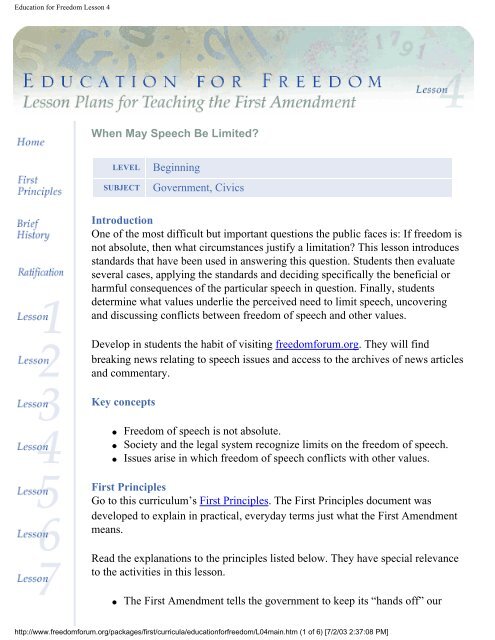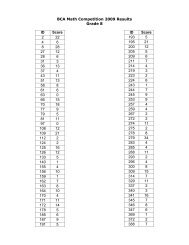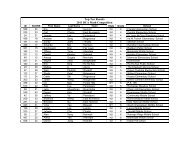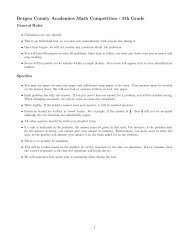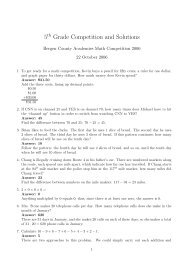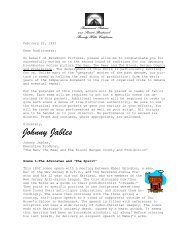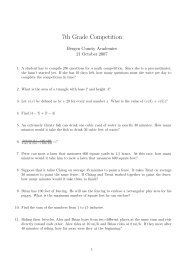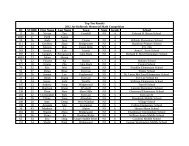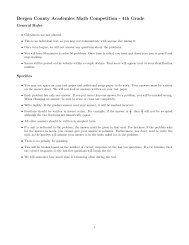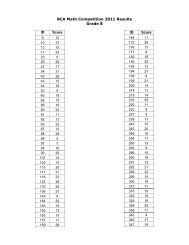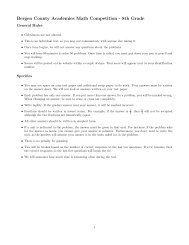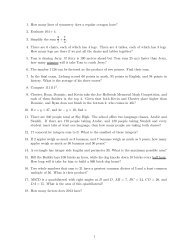Lesson plan on the 1st amendment.pdf
Lesson plan on the 1st amendment.pdf
Lesson plan on the 1st amendment.pdf
Create successful ePaper yourself
Turn your PDF publications into a flip-book with our unique Google optimized e-Paper software.
Educati<strong>on</strong> for Freedom <str<strong>on</strong>g>Less<strong>on</strong></str<strong>on</strong>g> 4<br />
When May Speech Be Limited?<br />
LEVEL<br />
SUBJECT<br />
Beginning<br />
Government, Civics<br />
Introducti<strong>on</strong><br />
One of <strong>the</strong> most difficult but important questi<strong>on</strong>s <strong>the</strong> public faces is: If freedom is<br />
not absolute, <strong>the</strong>n what circumstances justify a limitati<strong>on</strong>? This less<strong>on</strong> introduces<br />
standards that have been used in answering this questi<strong>on</strong>. Students <strong>the</strong>n evaluate<br />
several cases, applying <strong>the</strong> standards and deciding specifically <strong>the</strong> beneficial or<br />
harmful c<strong>on</strong>sequences of <strong>the</strong> particular speech in questi<strong>on</strong>. Finally, students<br />
determine what values underlie <strong>the</strong> perceived need to limit speech, uncovering<br />
and discussing c<strong>on</strong>flicts between freedom of speech and o<strong>the</strong>r values.<br />
Develop in students <strong>the</strong> habit of visiting freedomforum.org. They will find<br />
breaking news relating to speech issues and access to <strong>the</strong> archives of news articles<br />
and commentary.<br />
Key c<strong>on</strong>cepts<br />
●<br />
●<br />
●<br />
Freedom of speech is not absolute.<br />
Society and <strong>the</strong> legal system recognize limits <strong>on</strong> <strong>the</strong> freedom of speech.<br />
Issues arise in which freedom of speech c<strong>on</strong>flicts with o<strong>the</strong>r values.<br />
First Principles<br />
Go to this curriculum’s First Principles. The First Principles document was<br />
developed to explain in practical, everyday terms just what <strong>the</strong> First Amendment<br />
means.<br />
Read <strong>the</strong> ex<str<strong>on</strong>g>plan</str<strong>on</strong>g>ati<strong>on</strong>s to <strong>the</strong> principles listed below. They have special relevance<br />
to <strong>the</strong> activities in this less<strong>on</strong>.<br />
●<br />
The First Amendment tells <strong>the</strong> government to keep its “hands off” our<br />
http://www.freedomforum.org/packages/first/curricula/educati<strong>on</strong>forfreedom/L04main.htm (1 of 6) [7/2/03 2:37:08 PM]
Educati<strong>on</strong> for Freedom <str<strong>on</strong>g>Less<strong>on</strong></str<strong>on</strong>g> 4<br />
religi<strong>on</strong>, our ideas, our ability to express ourselves.<br />
●<br />
“Who draws <strong>the</strong> line, and how?” is a key questi<strong>on</strong>.<br />
First moments<br />
Review <strong>the</strong> benefits of freedom of speech in a democracy. Point out that <strong>the</strong> First<br />
Amendment states “C<strong>on</strong>gress shall make no law … abridging <strong>the</strong> freedom of<br />
speech.” That sounds very straightforward and simple. Ask <strong>the</strong> students to<br />
imagine this scene:<br />
Your pep band is at a rival school across town for a game <strong>on</strong>e evening. Suddenly<br />
<strong>the</strong>y find <strong>the</strong>mselves surrounded by angry, taunting students from <strong>the</strong> o<strong>the</strong>r<br />
school. The crowd shouts, “You stink!” “You’ll never get home t<strong>on</strong>ight alive!”<br />
“You’re g<strong>on</strong>na pay for being here!” Even though no <strong>on</strong>e has touched any<strong>on</strong>e,<br />
some fear for <strong>the</strong>ir lives. Does <strong>the</strong> crowd have <strong>the</strong> c<strong>on</strong>stituti<strong>on</strong>al right to yell at<br />
<strong>the</strong> pep band members?<br />
Use student discussi<strong>on</strong> as a springboard for <strong>the</strong> idea that society and <strong>the</strong> courts<br />
have agreed up<strong>on</strong> limits to free speech. You may also c<strong>on</strong>sider: Which is more at<br />
risk, student safety or free speech?<br />
In <strong>the</strong> example, <strong>the</strong> hecklers are causing a dangerous situati<strong>on</strong> that could easily<br />
get out of hand. At a minimum, <strong>the</strong>y are causing great distress to <strong>the</strong> surrounded<br />
students. Various laws might be applied to <strong>the</strong> incident depending <strong>on</strong> <strong>the</strong> number<br />
of perpetrators, <strong>the</strong> presence of weap<strong>on</strong>s, <strong>the</strong> age of <strong>the</strong> victims and even where<br />
<strong>the</strong> incident takes place. Legislatures, as well as courts and law- enforcement<br />
agencies, influence how <strong>the</strong>se incidents are handled. Teachers, check <strong>on</strong> <strong>the</strong><br />
policies and laws in your local jurisdicti<strong>on</strong>s.<br />
Procedure<br />
1. Distribute Limits of Freedom of Speech. Review <strong>the</strong> tests that <strong>the</strong><br />
Supreme Court has established to determine whe<strong>the</strong>r speech may be<br />
limited. You may also want to discuss symbolic speech with <strong>the</strong> students<br />
before giving students <strong>the</strong> case studies. (Symbolic speech has been defined<br />
as <strong>the</strong> communicati<strong>on</strong> of an idea through an acti<strong>on</strong>.)<br />
2. Have students work in small groups to complete <strong>the</strong> Limits of Freedom of<br />
Speech Case Studies. Students may be given all <strong>the</strong> case studies or <strong>on</strong>ly<br />
some of <strong>the</strong> studies. You may wish to download and print <strong>the</strong>m as cards in<br />
order to distribute individual cases to each group. Use <strong>the</strong> tests <strong>on</strong> limits to<br />
freedom of speech as a way to structure student debate over <strong>the</strong> cases.<br />
http://www.freedomforum.org/packages/first/curricula/educati<strong>on</strong>forfreedom/L04main.htm (2 of 6) [7/2/03 2:37:08 PM]
Educati<strong>on</strong> for Freedom <str<strong>on</strong>g>Less<strong>on</strong></str<strong>on</strong>g> 4<br />
(The case studies can also be completed individually <strong>on</strong>line if you prefer<br />
to do this as homework, or each group could focus <strong>on</strong> a selected case.)<br />
The case studies:<br />
Case study 1—Permits and dem<strong>on</strong>strati<strong>on</strong>s<br />
Case study 2—Burning a selective service registrati<strong>on</strong> certificate<br />
Case study 3—Ga<strong>the</strong>ring petiti<strong>on</strong>s in a shopping mall<br />
Case study 4—Obscene or indecent ph<strong>on</strong>e calls<br />
Case study 5—Distributi<strong>on</strong> of an<strong>on</strong>ymous political flyers<br />
Case study 6—Third-party candidate inclusi<strong>on</strong> in televised debates<br />
Case study 7—Student speech at school assemblies<br />
Case study—Answers<br />
3. When students have finished, have <strong>the</strong>m take turns explaining what <strong>the</strong>y<br />
decided in each case and why. Check which groups or individual students<br />
agreed and which disagreed. When disagreements arise, refer to <strong>the</strong> tests,<br />
discussing (1) <strong>the</strong> potential for <strong>the</strong> speech to result in a harmful<br />
c<strong>on</strong>sequence, 2) <strong>the</strong> probability that this might occur, and 3) how to<br />
resolve c<strong>on</strong>flicting values.<br />
4. After this introducti<strong>on</strong> to <strong>the</strong> tests, have students study <strong>on</strong>e of <strong>the</strong>se<br />
guidelines for limiting speech. Students will <strong>the</strong>n write a pers<strong>on</strong>al reacti<strong>on</strong><br />
paper <strong>on</strong> <strong>the</strong> topic: Do you agree or disagree with <strong>the</strong> necessity for this<br />
limit <strong>on</strong> speech?<br />
Enrichment<br />
To help students understand that freedom of speech is a c<strong>on</strong>temporary issue, have<br />
<strong>the</strong>m scan <strong>the</strong> newspaper for approximately <strong>on</strong>e week to find articles regarding<br />
freedom-of-speech issues. Clip and glue each article to a piece of paper. Beneath<br />
<strong>the</strong> article, students should indicate <strong>the</strong> specific speech issue involved and<br />
whe<strong>the</strong>r or not, in <strong>the</strong>ir opini<strong>on</strong>, <strong>the</strong> speech would be protected.<br />
Resources<br />
On <strong>the</strong> Web<br />
ACLU Briefing Paper, No. 10<br />
“Freedom of Expressi<strong>on</strong>” gives an overview of pure and symbolic<br />
speech, limits to speech and three reas<strong>on</strong>s why freedom of<br />
expressi<strong>on</strong> is essential to a free society.<br />
Ask Sybil Liberty about your right to Free Expressi<strong>on</strong><br />
Answers to students' basic questi<strong>on</strong>s.<br />
http://www.freedomforum.org/packages/first/curricula/educati<strong>on</strong>forfreedom/L04main.htm (3 of 6) [7/2/03 2:37:08 PM]
Educati<strong>on</strong> for Freedom <str<strong>on</strong>g>Less<strong>on</strong></str<strong>on</strong>g> 4<br />
Heckler’s Veto<br />
An activity based <strong>on</strong> an actual case that occurred at Northwestern<br />
University in March 1999.<br />
Heckler’s Veto<br />
Columnist Nat Hentoff <strong>on</strong> use of <strong>the</strong> heckler’s veto to limit free<br />
speech.<br />
freedomforum.org<br />
CD<br />
Goldman, Jerry. "The U.S. Supreme Court’s Greatest Hits." CD-<br />
ROM. Multimedia: audio, images, text. 1999.<br />
Developed and edited by Jerry Goldman,<br />
Northwestern University professor and developer of<br />
OYEZ Web site. C<strong>on</strong>tains more than 70 hours of <strong>the</strong><br />
actual oral argument in 50 of <strong>the</strong> most significant<br />
c<strong>on</strong>stituti<strong>on</strong>al cases, searchable by name, date and<br />
justices participating. Cases include Lee v. Weisman,<br />
Miller v. California, Roth v. United States, Tinker v.<br />
Des Moines Ind. Comm. School Dist.<br />
In print<br />
Hentoff, Nat. Free Speech for Me — But Not for Thee.<br />
HarperCollins Publishers, Inc. 1992.<br />
McElroy, Wendy. Queen Silver. Prome<strong>the</strong>us Books. 1999.<br />
Biography of a passi<strong>on</strong>ate advocate for women and labor. Includes<br />
articles and speeches.<br />
Nati<strong>on</strong>al Standards<br />
U.S. History, Standard 8: Understands <strong>the</strong> instituti<strong>on</strong>s and practices of<br />
government created during <strong>the</strong> Revoluti<strong>on</strong> and how <strong>the</strong>se elements were revised<br />
between 1787 and 1815 to create <strong>the</strong> foundati<strong>on</strong> of <strong>the</strong> American political system<br />
based <strong>on</strong> <strong>the</strong> U.S. C<strong>on</strong>stituti<strong>on</strong> and <strong>the</strong> Bill of Rights.<br />
Civics, Standard 8: Understands <strong>the</strong> central ideas of American c<strong>on</strong>stituti<strong>on</strong>al<br />
government and how this form of government has shaped <strong>the</strong> character of<br />
American society.<br />
http://www.freedomforum.org/packages/first/curricula/educati<strong>on</strong>forfreedom/L04main.htm (4 of 6) [7/2/03 2:37:08 PM]
Educati<strong>on</strong> for Freedom <str<strong>on</strong>g>Less<strong>on</strong></str<strong>on</strong>g> 4<br />
Civics, Standard 18: Understands <strong>the</strong> role and importance of law in <strong>the</strong> American<br />
c<strong>on</strong>stituti<strong>on</strong>al system and issues regarding <strong>the</strong> judicial protecti<strong>on</strong> of individual<br />
rights.<br />
Civics Standard 26: Understands issues regarding <strong>the</strong> proper scope and limits of<br />
rights and <strong>the</strong> relati<strong>on</strong>ships am<strong>on</strong>g pers<strong>on</strong>al, political, and ec<strong>on</strong>omic rights.<br />
Benchmarks<br />
U.S. History, Standard 8, Grades 9-12: Understands <strong>the</strong> Bill of Rights and various<br />
challenges to it.<br />
Civics Standard 8, Grades 6-8: Knows opposing positi<strong>on</strong>s <strong>on</strong> current issues<br />
involving c<strong>on</strong>stituti<strong>on</strong>al protecti<strong>on</strong> of individual rights, such as limits <strong>on</strong> speech<br />
(e.g., "hate speech," advertising), separati<strong>on</strong> of church and state (e.g., school<br />
vouchers, prayer in public schools), cruel and unusual punishment (e.g., death<br />
penalty), search and seizure (e.g., warrantless searches), and privacy (e.g.,<br />
nati<strong>on</strong>al identificati<strong>on</strong> cards, wiretapping).<br />
Civics, Standard 18, Grades 9-12: Understands <strong>the</strong> effects of Americans relying<br />
<strong>on</strong> <strong>the</strong> legal system to solve social, ec<strong>on</strong>omic and political problems ra<strong>the</strong>r than<br />
using o<strong>the</strong>r means, such as private negotiati<strong>on</strong>s, mediati<strong>on</strong> and participati<strong>on</strong> in<br />
<strong>the</strong> political process<br />
Civics, Standard 26, Grades 6-8: Understands what is meant by <strong>the</strong> "scope and<br />
limits" of a right; Grades 6-8: Understands <strong>the</strong> argument that all rights have<br />
limits, and knows criteria comm<strong>on</strong>ly used in determining what limits should be<br />
placed <strong>on</strong> specific rights (e.g., clear-and-present-danger rule, compellinggovernment-interest<br />
test, nati<strong>on</strong>al security, libel or slander, public safety, equal<br />
opportunity).<br />
Interdisciplinary<br />
Speech: Students prepare a speech <strong>on</strong> a speech-related topic, such as It is/is not<br />
necessary to limit freedom of speech.<br />
Debate: Students debate whe<strong>the</strong>r <strong>the</strong>re should be limits <strong>on</strong> freedom of speech.<br />
Use Limits of Freedom of Speech to understand <strong>the</strong> reas<strong>on</strong>s speech is limited.<br />
Students may use any of <strong>the</strong> case studies or add <strong>the</strong>ir own to substantiate <strong>the</strong>ir<br />
positi<strong>on</strong>s.<br />
BACK TO HOME PAGE<br />
http://www.freedomforum.org/packages/first/curricula/educati<strong>on</strong>forfreedom/L04main.htm (5 of 6) [7/2/03 2:37:08 PM]
Educati<strong>on</strong> for Freedom <str<strong>on</strong>g>Less<strong>on</strong></str<strong>on</strong>g> 4<br />
http://www.freedomforum.org/packages/first/curricula/educati<strong>on</strong>forfreedom/L04main.htm (6 of 6) [7/2/03 2:37:08 PM]
Educati<strong>on</strong> for Freedom <str<strong>on</strong>g>Less<strong>on</strong></str<strong>on</strong>g> 4<br />
Answers, case studies: when may speech be limited?<br />
Case 1 — This case, which involved <strong>the</strong> Nati<strong>on</strong>al Socialist Party of America<br />
and <strong>the</strong> Village of Skokie (a suburb of Chicago), generated rulings in both<br />
Illinois state and federal courts. The Illinois Supreme Court, by a 6-to-1 margin,<br />
held that displaying swastikas was a form of symbolic speech protected by <strong>the</strong><br />
First Amendment. The court fur<strong>the</strong>r held that <strong>the</strong> “fighting words” doctrine<br />
developed by <strong>the</strong> Supreme Court did not permit “prior restraint” of <strong>the</strong> Nazis’<br />
speech because advance notice of <strong>the</strong> march gave citizens <strong>the</strong> opti<strong>on</strong> of avoiding<br />
face-to-face insults. Such prior restraint to prevent violence, which <strong>the</strong> court<br />
admitted was a possibility, amounted to a “heckler’s veto.”<br />
A m<strong>on</strong>th later, a federal district judge ruled that Skokie’s ordinances were<br />
unc<strong>on</strong>stituti<strong>on</strong>al, holding that not <strong>on</strong>ly did <strong>the</strong> ordinances censor certain kinds<br />
of speech, <strong>the</strong>y provided for censorship <strong>on</strong> <strong>the</strong> basis of what might be said,<br />
ra<strong>the</strong>r than what was actually said. The judge said, “The ability of American<br />
society to tolerate <strong>the</strong> advocacy even of <strong>the</strong> hateful doctrines espoused by <strong>the</strong><br />
plaintiffs without aband<strong>on</strong>ing its commitment to freedom of speech and<br />
assembly is perhaps <strong>the</strong> best protecti<strong>on</strong> we have against <strong>the</strong> establishment of<br />
any Nazi-type regime in this country.” This decisi<strong>on</strong> was upheld by <strong>the</strong> court of<br />
appeals. When <strong>the</strong> Supreme Court refused to hear Nati<strong>on</strong>al Socialist Party of<br />
America v. Skokie, 432 U.S. 43 (1977). The decisi<strong>on</strong> of <strong>the</strong> court of appeals<br />
held.<br />
Case 2 — In <strong>the</strong> case of <strong>the</strong> United States v. O’Brien, <strong>the</strong> Supreme Court ruled<br />
8 to 1 against <strong>the</strong> protesters. The Court held that C<strong>on</strong>gress had <strong>the</strong> authority to<br />
raise armies and could <strong>the</strong>refore require that Selective Service registrati<strong>on</strong><br />
certificates (draft cards) be handled in particular ways. The military purposes of<br />
<strong>the</strong> draft law outweighed David O’Brien’s right to expressi<strong>on</strong> through symbolic<br />
speech (i.e., burning of his draft card). He had alternative ways to express<br />
himself that did not involve violating a valid law that prohibited destroying <strong>the</strong><br />
card.<br />
http://www.freedomforum.org/packages/first/curricul...nforfreedom/supportpages/L04-AnswersCaseStudies.htm (1 of 3) [7/2/03 2:37:52 PM]
Educati<strong>on</strong> for Freedom <str<strong>on</strong>g>Less<strong>on</strong></str<strong>on</strong>g> 4<br />
Case 3 — In this case, Pruneyard Shopping Center v. Robins (1980), <strong>the</strong> court<br />
ruled that Robins’ manner of speech was orderly and <strong>the</strong> activity was c<strong>on</strong>ducted<br />
in <strong>the</strong> comm<strong>on</strong> public area of <strong>the</strong> mall. Since <strong>the</strong> California C<strong>on</strong>stituti<strong>on</strong><br />
protected “speech and petiti<strong>on</strong>ing, reas<strong>on</strong>ably exercised, in shopping centers<br />
even when <strong>the</strong> shopping centers are privately owned,” <strong>the</strong> time, place, and<br />
manner test was not violated and <strong>the</strong> speech was protected.<br />
This case affirms <strong>the</strong> legal principle that state and local governments may give<br />
<strong>the</strong>ir citizens more free-speech rights than are accorded <strong>the</strong>m by <strong>the</strong> First<br />
Amendment and <strong>the</strong> federal c<strong>on</strong>stituti<strong>on</strong>.<br />
Case 4 — In this 1989 case, Sable Communicati<strong>on</strong>s of California v. FCC and<br />
Thornburgh, <strong>the</strong> Supreme Court said that <strong>the</strong> government could ban “obscene”<br />
communicati<strong>on</strong>s but not “indecent” communicati<strong>on</strong>s. While <strong>the</strong> Supreme Court<br />
agreed that preventing children from hearing indecent messages was a valid<br />
goal, it did not think this goal justified making indecent communicati<strong>on</strong>s illegal.<br />
While stopping “indecent” speech would protect children, it would also<br />
unc<strong>on</strong>stituti<strong>on</strong>ally deny adults access to protected “indecent” speech. The<br />
Supreme Court and o<strong>the</strong>r courts have cited Sable to rule unc<strong>on</strong>stituti<strong>on</strong>al federal<br />
laws setting limits <strong>on</strong> Internet expressi<strong>on</strong>.<br />
Case 5 — The Court ruled in McIntyre v. Ohio Electi<strong>on</strong>s Commissi<strong>on</strong> (1995)<br />
that Ohio’s ban <strong>on</strong> an<strong>on</strong>ymous electi<strong>on</strong>s literature was too broad to achieve <strong>the</strong><br />
purpose that it was intended to achieve — protecting voters and candidates from<br />
false, misleading or libelous statements. While such a state interest might be<br />
compelling, <strong>the</strong> remedy used by <strong>the</strong> state was too broad. The court stated,<br />
“An<strong>on</strong>ymous pamphleteering is … an h<strong>on</strong>orable traditi<strong>on</strong> of advocacy and of<br />
dissent” and held that McIntyre’s speech was protected.<br />
Case 6 — Forbes lost in district court but w<strong>on</strong> <strong>on</strong> appeal. AETC appealed to <strong>the</strong><br />
Supreme Court, where <strong>the</strong> case was argued <strong>on</strong> October 8, 1997. In a 6-to-3<br />
decisi<strong>on</strong>, <strong>the</strong> court found in favor of AETC since AETC had created a<br />
“n<strong>on</strong>public forum” when it selected participants by “objective indicati<strong>on</strong>s of<br />
http://www.freedomforum.org/packages/first/curricul...nforfreedom/supportpages/L04-AnswersCaseStudies.htm (2 of 3) [7/2/03 2:37:52 PM]
Educati<strong>on</strong> for Freedom <str<strong>on</strong>g>Less<strong>on</strong></str<strong>on</strong>g> 4<br />
<strong>the</strong>ir popular support” ra<strong>the</strong>r than <strong>the</strong>ir points of view. Arkansas Ed. Televisi<strong>on</strong><br />
Comm. v. Forbes determined that public broadcasters can exclude participants<br />
from sp<strong>on</strong>sored debates as l<strong>on</strong>g as <strong>the</strong> debates are not public forums. News<br />
coverage of <strong>the</strong> case can be found <strong>on</strong> washingt<strong>on</strong>post.com.<br />
Case 7 — The U.S. Supreme Court ruled in Be<strong>the</strong>l School District No. 403 v.<br />
Fraser that school systems may prohibit <strong>the</strong> use of vulgar and offensive<br />
language at school-sp<strong>on</strong>sored activities or forums. The informal suggesti<strong>on</strong> by<br />
teachers not to give <strong>the</strong> speech was sufficient warning to Fraser. The decisi<strong>on</strong><br />
held: “It is a highly appropriate functi<strong>on</strong> of public school educati<strong>on</strong> to prohibit<br />
<strong>the</strong> use of vulgar and offensive terms in public discourse. Nothing in <strong>the</strong><br />
C<strong>on</strong>stituti<strong>on</strong> prohibits <strong>the</strong> states from insisting that certain modes of expressi<strong>on</strong><br />
are inappropriate and subject to sancti<strong>on</strong>s. The inculcati<strong>on</strong> of <strong>the</strong>se values is<br />
truly <strong>the</strong> work of <strong>the</strong> school, and <strong>the</strong> determinati<strong>on</strong> of what manner of speech is<br />
inappropriate properly rests with <strong>the</strong> school board.”<br />
Note that this decisi<strong>on</strong> applies <strong>on</strong>ly to school-sp<strong>on</strong>sored expressi<strong>on</strong>. The Be<strong>the</strong>l<br />
ruling and standard do not apply to individual expressi<strong>on</strong>, such as wearing an<br />
inscribed pin or a shirt with a message that does not disrupt <strong>the</strong> school or<br />
educati<strong>on</strong>al process. The court made it clear in Be<strong>the</strong>l that it was not<br />
overturning Tinker, with <strong>the</strong> “disrupti<strong>on</strong>” standard that applies to individual<br />
expressi<strong>on</strong>. And that test survived Hazelwood, as well.<br />
BACK<br />
http://www.freedomforum.org/packages/first/curricul...nforfreedom/supportpages/L04-AnswersCaseStudies.htm (3 of 3) [7/2/03 2:37:52 PM]


